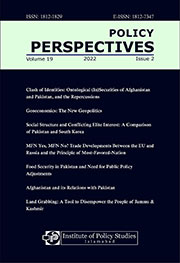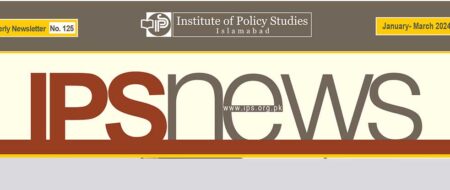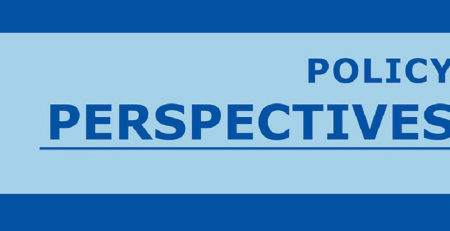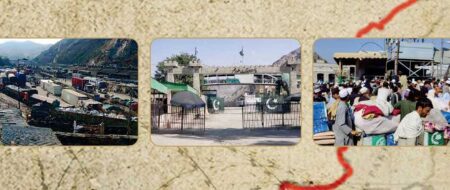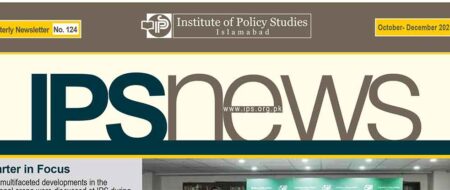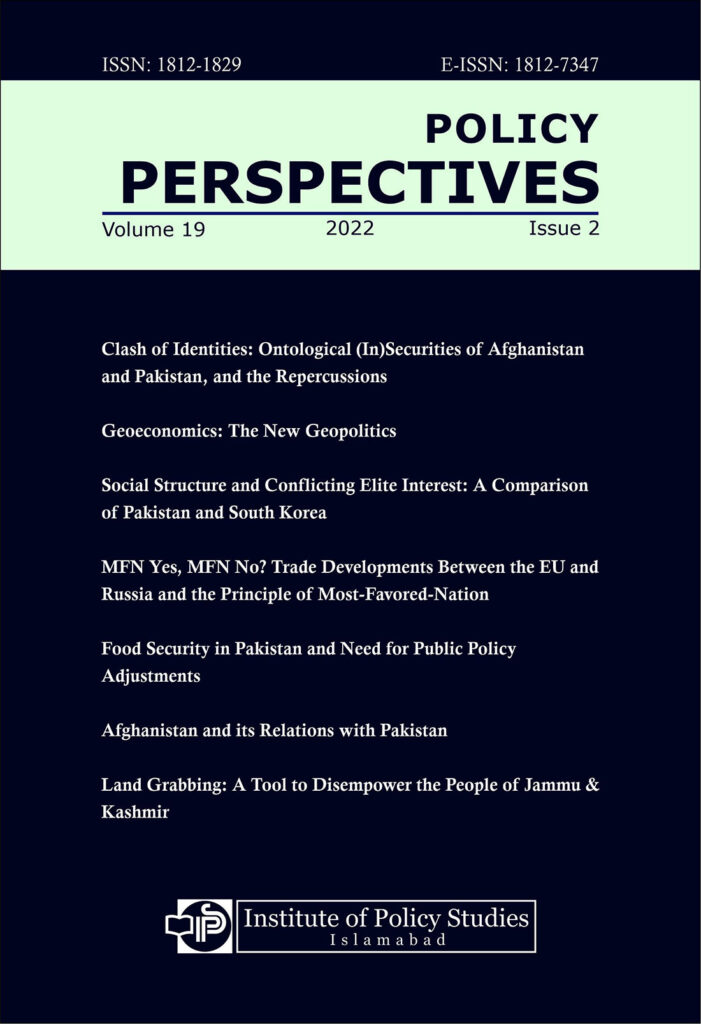Policy Perspectives (Volume 19, Issue 2)
|
Editor-in-Chief: Khalid Rahman Download Contents |
Policy Perspectives (Volume 19, Issue 2)
The latest issue of Policy Perspectives brings forth research, analyses and commentaries on various topics concerning national, regional, and international issues from policy experts, academics, and practitioners.
Dr Taj in her article ‘Clash of Identities: Ontological (In)Securities of Afghanistan and Pakistan, and the Repercussions’ gives a perspective for understanding the relationship between Afghanistan and Pakistan. She discusses how the Pashtun state identity of Afghanistan interacts with the Islamic identity of Pakistan, causing anxiety over self-identity in both states and confronting their ontological (in)security challenges.
Author: Dr Farhat Taj, PhD, Associate Professor, The University of Tromsø – UiT The Arctic University of Norway, Tromsø, Norway.
https://doi.org/10.13169/polipers.19.2.ra1
The article ‘Geoeconomics: The New Geopolitics’ emphasizes that economics and politics determine, define, and drive each other. It suggests that geoeconomics is replacing geopolitics as a new global force, particularly when the underlying phenomenon of power and control is factored in.
Author: Aneela Shahzad, Geopolitical Analyst; Author of the following books: Understanding Geopolitics; and Geopolitics – from the Other Side.
https://doi.org/10.13169/polipers.19.2.ra2
The next article ‘Social Structure and Conflicting Elite Interest: A Comparison of Pakistan and South Korea’ is a comparative study of the elite capure in Pakistan and developmental structure in South Korea. It sets out to explore the reasons due to which Pakitani state remains constricted by social actors, failing to achieve a developmental state, despite similar post-colonial trajectories of Pakistan and South Korea.
Author: Anish Mishra, PhD Candidate, Institut für Politische Wissenschaft (IPW), Faculty of Economics and Social Sciences, Heidelberg University, Heidelberg, Germany. The working title of his doctoral dissertation is “Patterns and Processes of Regime Oscillations in South and Southeast Asia”.
https://doi.org/10.13169/polipers.19.2.ra3
Frans Lavdari and Xhulio Lavdari evaluate the repercussions of suspension of Russia’s MFN status on EU-Russia trade relations in ‘MFN Yes, MFN No? Trade Developments Between the EU and Russia and the Principle of Most-Favored Nation’. . They underscore that this move would affect Russia more than European Union (EU).
Authors: Frans Lavdari, LUISS Guido Carli University, Department of Business and Management, Rome, Italy; and Xhulio Lavdari, University of Exeter, Department of Engineering, Exeter, United Kingdom (UK).
https://doi.org/10.13169/polipers.19.2.ra4
The final article, ‘Food Security in Pakistan and Need for Public Policy Adjustments’ calls for integration and alignment in public policies for ensuring sustainable food and nutrition security, in the post-Covid-19 times.
Authors: Touqeer Ahmad, PhD Scholar, Department of Economics, Faculty of Social Sciences, PMAS Arid Agriculture University, Rawalpindi, Pakistan; and Dr Abdul Saboor, Professor, Department of Economics; Dean to Faculty of Social Sciences, PMAS Arid Agriculture University, Rawalpindi, Pakistan.
https://doi.org/10.13169/polipers.19.2.ra5
The symposium section includes ‘Afghanistan and its Relations with Pakistan’ in which four prominent experts deliberate on the current state of affairs in Afghanistan and the matters related to Pakistan-Afghanistan relations in the broader perspective of history, ideology, and culture.
Contributors: Ambassador (r) Syed Abrar Hussain; Professor Dr Fakhr-ul-Islam, former Director, Pakistan Study Center, University of Peshawar, Peshawar; Ambassador (r) Ayaz Wazir, former Director General (Afghanistan) at Pakistan’s Ministry of Foreign Affairs; and Brigadier (r) Said Nazir.
https://doi.org/10.13169/polipers.19.2.symp
The commentary ‘Land Grabbing: A Tool to Disempower the People of Jammu Kashmir’ discusses Indian efforts to bring about demographic change in occupied J&K. Through settler colonial legislation, India is allowing radical changes in domicile laws, allowing India’s armed forces to take over land, and altering the electoral boundaries.
Author: Nasir Qadri, Human Rights Lawyer; Founder & Executive Director, Legal Forum for Kashmir (LFK), Islamabad, Pakistan; PhD scholar, thesis in progress on “Settler-Colonialism, War of Liberation and International Law”.
https://doi.org/10.13169/polipers.19.2.cm1
The issue concludes with the ‘Dialogue at IPS section which covers important themes from some topical discussions held at the Institute of Policy Studies during recent months.
The full text of the articles can be accessed at:
<https://www.scienceopen.com/search#collection/5059b558-e8e5-4f35-8766-593c996cbc72>



